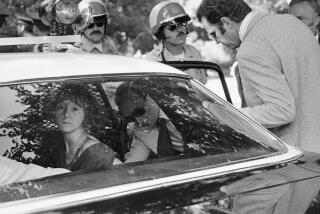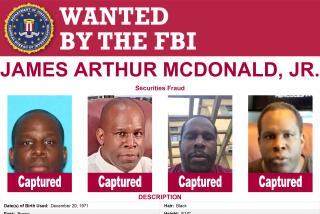Jeffrey MacDonald case: Two views of new ‘Fatal Vision’ evidence
WILMINGTON, N.C. – For 42 years, Dr. Jeffrey MacDonald has clung to his story: Four intruders, including a woman in a floppy hat, killed his wife and two young daughters one night in February 1970.
In federal court Monday, MacDonald’s lawyers offered new evidence they say bolsters their client’s story and will prove that he was wrongfully convicted of stabbing and bludgeoning his family to death inside their home at Ft. Bragg, N.C.
MacDonald, now 68, was an Army doctor assigned to U.S. Special Forces when his wife, Colette, and daughters Kimberley, 5, and Kristen, 2, were murdered in a case that became the basis for a bestselling book, “Fatal Vision,’’ and a hit TV miniseries. He is serving three life sentences.
MacDonald has been granted a new hearing based on defense contentions that newly tested DNA points to other suspects, and that sworn statements by a former federal marshal show a prosecutor threatened a crucial witness whose testimony could have exonerated the Army captain. DNA from three hairs found inside the house does not match MacDonald, his wife or his children, the defense says.
Opening testimony focused on the marshal and a heroin addict the defense says was among the intruders. Both are now dead, but their actions from years ago were resurrected in court as the defense sought to persuade a federal judge to overturn MacDonald’s 1979 murder conviction.
Testimony on the DNA evidence is expected later in the hearing, which could last up to two weeks.
MacDonald’s lead lawyer, Gordon Widenhouse, told U.S. District Court Judge James C. Fox that “no reasonable juror’’ who heard the new evidence would find MacDonald guilty.
In opening statements, Widenhouse said deputy U.S. Marshal Jimmy Britt heard the heroin addict, Helena Stoeckley, tell a federal prosecutor in 1979 that she and others were inside MacDonald’s home the night of the murders. But because prosecutor James Blackburn threatened Stoeckley if she testified to that effect, Widenhouse said, Stoeckley testified at MacDonald’s 1979 federal trial that she couldn’t recall anything from that night.
Blackburn, who pleaded guilty in 1993 to embezzlement and obstruction of justice in an unrelated case, is on the witness list for the hearing.
The defense says Stoeckley, who died in 1983, was the woman in a floppy hat MacDonald says chanted “Acid is groovy, kill the pigs’’ while three men killed his family. MacDonald told investigators the men stabbed and beat him unconscious; prosecutors theorized that his wounds were either self-inflicted or a result of a violent struggle with his wife.
Police found the word “pig’’ scrawled in blood on a headboard in MacDonald’s home. The same word was written in blood at the murder scene of the Charles Manson cult killings in California six months earlier. Prosecutors said MacDonald staged the scene after reading an account of the Manson murders in an Esquire magazine article found in his home.
Wade Smith, a MacDonald defense lawyer in 1979, testified Monday that Britt called him in 2005 and told him he was “burdened heavily, morally’’ by something from the MacDonald trial. In sworn statements, Britt said prosecutor Blackburn threatened to charge Stoeckley with murder if she testified that she had been at the murder scene.
Britt also said Stoeckley told him separately that she was there that night, and accurately described a hobby horse in the MacDonald home.
Smith said Britt told him that he waited a quarter-century to tell his story because he did not want to appear disloyal to law enforcement by undermining the prosecution’s case.
“He sort of unloaded his soul,’’ Smith testified.
But on cross-examination Monday, Smith conceded that Stoeckley repeatedly told defense lawyers during a long interview session in 1979 that she couldn’t remember anything about the night of the murders.
“I can’t help you -- I wasn’t in the home,’’ prosecutor John Bruce quoted Stoeckley as telling Smith and another defense lawyer the day before she testified.
Smith also testified that he told Blackburn that Stoeckley’s interview produced little of real value to the defense, which had hoped that Stoeckley would incriminate herself and others. Smith said Blackburn told him that Stoeckley told prosecutors little of interest when they interviewed her.
The prosecution Monday portrayed Stoeckley as a deeply disturbed drug addict. In her 1979 testimony, Stoeckley admitted shooting up heroin and opium, taking mescaline and smoking marijuana in the hours before the murders. She testified that she shot up heroin or opium six or seven times a day for up to nine years.
Prosecutors quoted statements by Stoeckley’s mother, who described her daughter as “a physical and mental wreck’’ who “is going to talk all kinds of nonsense.’’ The prosecution also introduced evidence that Britt provided contradictory details about when and where he talked to Stoeckley.
But Smith testified that even if Britt was mistaken on some details, he gave consistent accounts of Stoeckley’s interview with the prosecutor. Smith also said a police detective who used Stoeckley as a drug informant called her “the most reliable informant I ever had.’’
The hearing resumes Tuesday morning.
ALSO:
Teens who ‘sext’ more likely to have sex, study suggests
Penn State’s Jerry Sandusky to be sentenced Oct. 9 for child abuse
Panda-monium! Panda born at National Zoo; panda cam overwhelmed
More to Read
Sign up for Essential California
The most important California stories and recommendations in your inbox every morning.
You may occasionally receive promotional content from the Los Angeles Times.











